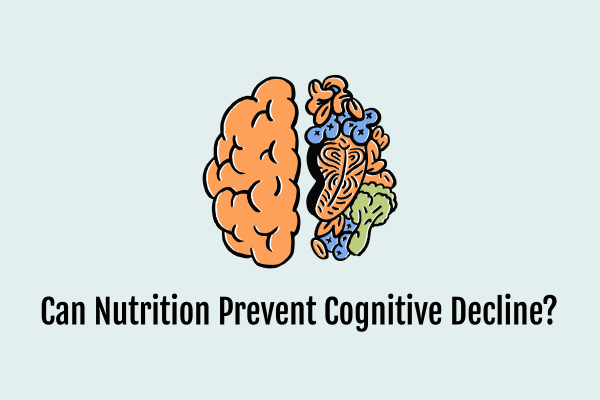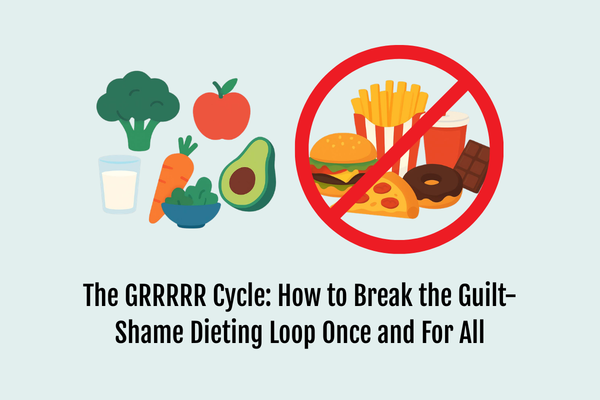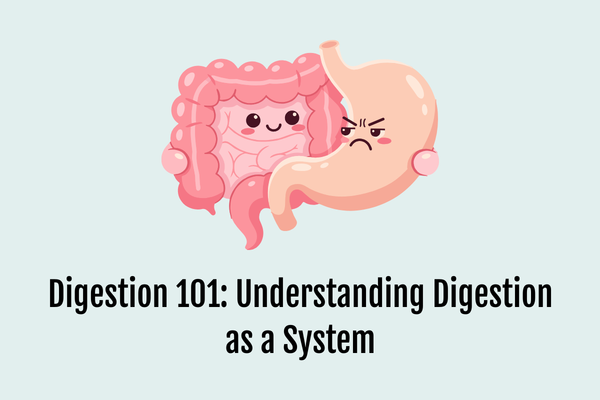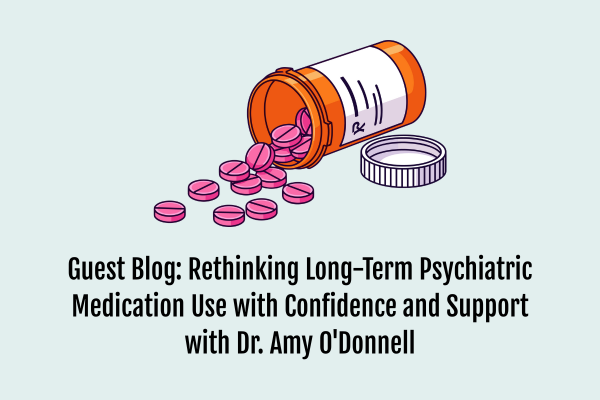Can Nutrition Prevent Cognitive Decline?
Written by: Sophia Schweiger
Reviewed by: Andrew Wade, MS, RDN, LDN, CSSD
Understanding Cognitive Decline and Why Nutrition Matters
As we age, occasional forgetfulness (such as misplacing keys or forgetting a name) is common. But when memory lapses become frequent and interfere with daily life, they may signify early cognitive decline. The good news is emerging research suggests nutrition is a modifiable factor in brain-health and could play a role in slowing or preventing cognitive decline.
The brain is one of the body’s most energy-demanding organs, using about 20% of the body’s total energy. It relies on a steady supply of nutrients, a healthy vascular supply, and metabolic regulation, all of which can be supported by a healthy diet and lifestyle. Poor dietary habits—for example, a high intake of processed foods, refined sugars, and unhealthy fats—may increase oxidative stress, insulin resistance, and inflammation, all of which are linked to cognitive decline.
In this blog, we will review the most current research on how nutrition affects brain health, examine key dietary patterns and nutrients, and discuss how dietitians can help translate these insights into practical strategies. While nutrition is not a guarantee against dementia, adopting a nutritional strategy grounded in the research can form part of a broader brain-health plan.
What the Research Says: Diets and Cognitive Decline
Let’s take a look at what the research says about different dietary patterns and brain health:
Mediterranean Diet (MedDiet)
A dietary pattern based on traditional foods consumed in countries bordering the Mediterranean Sea. This diet emphasizes plant-based foods and healthy fats, mainly from olive oil, with moderate amounts of fish, poultry, dairy, and eggs. It also includes plenty of fresh herbs and spices while limiting processed foods, added sugars, refined grains, and red meats.
Research has consistently linked this eating pattern with better memory, slower cognitive decline, and reduced risk of mild cognitive impairment and Alzheimer’s disease. These benefits are likely due to its rich antioxidants, healthy fats, and anti-inflammatory effects that support brain health and vascular function. However, while findings are generally favorable, the evidence remains somewhat limited and inconsistent, particularly regarding brain-imaging outcomes.Therefore, more long-term studies with larger groups are needed to further identify clear findings for this dietary pattern.
MIND Diet
The Mediterranean-DASH Intervention for Neurodegenerative Delay (MIND) diet is a hybrid of the Mediterranean diet and the Dietary Approaches to Stop Hypertension (DASH) diet. However, it has an emphasis on certain foods thought to protect the brain, such as green leafy vegetables and berries, and it limits other foods such as red meat, butter, cheese, sweets, and processed foods.
Large-scale observational studies support the MIND diet’s association with a lower risk of dementia. Additionally, some randomized controlled trials (RCTs) have shown modest improvements in cognitive performance and brain imaging measures. However, evidence from RCTs on this relatively new dietary pattern is still emerging, and larger, longer-term studies are needed to confirm these effects.
Ketogenic Diet
Commonly known as the “keto” diet, this dietary pattern is high in fat and low in carbohydrates, aiming to induce a metabolic state of ketosis.” The typical macronutrient breakdown is as follows: ~70% of calories come from fat, ~20% from protein, and ~10% from carbohydrates.
Although some studies suggest mild cognitive improvements, they are often done in individuals who are already in a diseased state. Additionally, most studies are small and short in duration. Finally, there are potential safety and feasibility issues of the diet in regard to lipid profiles (LDL and HDL), as well as adherence.
Uncertainty in the Research
- It’s clear that diet is just one part of a multifactorial approach to preventing cognitive decline—alongside regular physical activity, quality sleep, vascular risk management, and ongoing social and mental engagement. Nutrition alone cannot guarantee protection against cognitive decline or dementia.
- Some RCTs show no significant effect, especially when control diets include slight caloric restriction or other beneficial factors in overweight participants.
- Many studies are observational and thus subject to confounding variables: lifestyle, exercise, education, socioeconomic status, etc.
- Authors frequently note the need for long-term, large-scale RCTs to confirm the positive findings of their studies.
- The effect size in many studies, while meaningful, is usually quite modest with risk reductions only ranging from around 10–30%.
- Specifics about which nutrients in isolation matter, optimal timing (midlife vs. later life), the degree of dietary adherence and intake required, duration, and interactions with genotype (e.g., APOE ε4 status) remain less clear.
So, what does this all mean? You may be asking yourself, “Does diet even matter with all of this uncertainty in the data?” The short answer is yes. While the evidence is not yet definitive, numerous observational studies and several clinical trials suggest that dietary patterns rich in plant-based foods, healthy fats, and antioxidants are linked to better cognitive performance and a lower risk of dementia. These findings align with what we know about how nutrition supports vascular, metabolic, and inflammatory pathways involved in brain health.
However, because long-term, large-scale randomized control trials remain limited, and important questions about dose, duration, and individual variability persist, more research is needed to clarify the true impact of diet on cognitive decline.
Key Nutrients and Food Components for Brain Health
While it’s important to look at overall dietary patterns, certain nutrients and food components consistently emerge as beneficial across research. These nutrients often appear together in eating patterns like the Mediterranean and MIND diets, and they may support brain function through their effects on reducing inflammation, improving vascular health, and maintaining cellular integrity.
- Omega-3 fatty acids (especially EPA/DHA): present in fatty fish, as well as certain nuts/seeds and oils. These appear in brain health diets and may support cell membranes, reduce inflammation and improve vascular/neuronal function.
- B-vitamins (especially B6, B12, folate): elevated homocysteine is a risk factor for cognitive decline; diets rich in leafy greens, legumes, fortified grain, eggs, lean meats supply these important vitamins.
- Antioxidants / polyphenols / flavonoids: found in berries, leafy greens, nuts, dark chocolate, and tea; may mitigate oxidative stress and inflammation.
- Vitamin D: low levels may be associated with cognitive impairment.
- Choline: essential for acetylcholine synthesis and cell membrane structure; found in eggs, liver, soy, and poultry.
- Healthy, monounsaturated fats: often key components of the Mediterranean Diet and appear associated with better cognitive outcomes.
- Whole grains, beans/legumes, vegetables, fruit: part of the plant-rich patterns that repeatedly show association with better cognition.
Dietary Patterns for Brain Health: Updated Recommendations
Given the evidence above, the following guidance is supported by research (while acknowledging limitations):
- Consider adopting a Mediterranean-style dietary pattern: Emphasize fruits, vegetables (especially leafy greens), legumes, whole grains, nuts/seeds, olive oil, moderate fish, limited red/processed meat, limited sweets/refined carbs. Evidence shows consistent association with slower cognitive decline and lower risk of mild cognitive impairment and Alzheimer's disease.
- Consider the MIND diet: For those especially focused on brain health, the MIND diet offers a more targeted version of the MedDiet/DASH with specific “brain-healthy” foods (e.g., berries twice/week, green leafy vegetables ≥ 6 servings/week). Its observational evidence is strong, though RCT evidence is still emerging.
- Ketogenic diet: As of now, this remains investigational for brain-health prevention; not broadly recommended for the general aging population for cognitive‐decline prevention until more evidence emerges.
- Focus on dietary patterns rather than isolating nutrients: The current research suggests patterns of eating matter more than isolated supplements or foods.
- Start earlier if possible: While many studies focus on older adults, some emerging evidence suggests diet across adulthood (even midlife or earlier) may influence trajectories of cognition.
- Combine diet with other lifestyle factors: Diet is just one part of a holistic brain-health strategy. Physical activity, cognitive stimulation, quality sleep, vascular and metabolic risk management (such as blood pressure, diabetes, and weight control), and social engagement all play important roles as well.
Summary and Takeaways
While no single diet offers a guarantee against cognitive decline, the current research supports the view that adopting a brain-healthy dietary pattern—particularly a Mediterranean-style or MIND-style pattern—may slow age-related cognitive decline and reduce risk of dementia. Importantly, nutrition should be viewed as one component of a broader brain-health strategy, alongside exercise, sleep, vascular health, mental engagement, and social connection.
Proactive Next Steps
If you’re concerned about memory changes or simply want to protect your long-term brain health, working with a Case Specific Nutrition registered dietitian can be a meaningful step. The research on diet and cognition continues to evolve, but evidence consistently points to the value of early, intentional attention to nutrition and lifestyle for maintaining cognitive function over time.
Along with personalized nutrition guidance, targeted lab testing can provide useful insight into your overall brain and metabolic health. Through our partnership with Rupa Health, Case Specific Nutrition offers convenient access to high-quality testing that helps us see the full picture. Assessing markers like cholesterol and ApoB, omega-3 status, homocysteine, inflammation (CRP), blood sugar control (glucose, insulin, HbA1c), thyroid function, and key micronutrient levels allows for a more individualized approach.
By combining these lab results with your nutrition plan, we can identify areas to optimize your diet to support brain and vascular health, address potential nutrient gaps, and reduce modifiable risk factors before they progress. Our team helps interpret your results and guide practical, evidence-based strategies to protect cognitive health now and into the future.
Connect with Our Team
If you’re interested in supporting your cognitive health through nutrition and evidence-based lifestyle strategies, you can connect with a Case Specific dietitian at scheduling@casespecificnutrition.com. Our team provides individualized nutrition care across the Greater Pittsburgh area, as well as in Erie, Raleigh, and Tampa.
Disclaimer: The information provided in this blog is for educational purposes only and is not intended to diagnose, treat, cure, or prevent any medical condition. This content is not medical advice and should not be used as a substitute for professional medical care. If you have any health concerns or medical conditions, please consult with a qualified healthcare provider before making any changes to your diet or lifestyle.
References:
- Valls-Pedret C, Sala-Vila A, Serra-Mir M, et al. Mediterranean diet and age-related cognitive decline: a randomized clinical trial. JAMA Intern Med. 2015;175(7):1094-1103. doi:10.1001/jamainternmed.2015.1668
- Barnes LL, Dhana K, Liu X, et al. Trial of the MIND diet for prevention of cognitive decline in older persons. N Engl J Med. 2023;389(7):602-611. doi:10.1056/NEJMoa2302368
- Timlin D, McCormack JM, Kerr M, et al. The MIND diet, cognitive function, and well-being among healthy adults at midlife: a randomised feasibility trial. BMC Nutr 11. 2025;59. https://doi.org/10.1186/s40795-025-01020-6
- Rong L, Peng Y, Shen Q, et al. Effects of ketogenic diet on cognitive function of patients with Alzheimer’s disease: a systematic review and meta-analysis. J Nutr Health Aging. 2024;28(8):100306. doi:10.1016/j.jnha.2024.100306
- Devranis P, Vassilopoulou E, Tsironis V, et al. Mediterranean diet, ketogenic diet or MIND diet for aging populations with cognitive decline: a systematic review. Life. 2023;13(1):173. doi:10.3390/life13010173





.webp)

